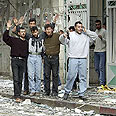
The IDF does not wish to endanger the lives of innocent civilians, but sometimes the circumstances require actions taken to protect the lives of soldiers, army sources said Thursday in response to the High Court's decision to ban the so-called "neighborly help procedure."
The High Court ruled that the procedure, whereby Palestinian civilians are sent to knock on the doors of wanted terror suspects and ask them to surrender – is illegal. The IDF has yet to issue an official response to the decision.
IDF sources also said that the procedure has not been used by the army in a long time, but that in certain cases, when forces conduct operations to arrest suspects in residential areas, the use of human shields is necessary in order to protect the soldiers' lives.
"The IDF continues to be moral, and acts morally in each and every operation, despite these difficulties," one source state.
The army began employing procedure during the "Defensive Shield" operation in the West Bank.
'The IDF does not operate in sterile conditions'
Following the harsh criticism leveled at the IDF, the army started employing a new procedure, also known as the "Early Warning Guidelines." This procedure forbids soldiers from involving civilians in operations to pursue wanted terrorists, unless the civilians agrees to assist the IDF, and if the procedure itself does not put them in risk.
In reality, IDF officers have admitted in the past that the new procedure is essentially the same as its earlier version, because the Palestinians are in no position to refuse the soldiers' request.
"We must bear in mind that the terrorists deliberately choose to operate from inside residential areas, and are using the population as a human shield. This makes things very difficult for the army," a former IDF paratroopers' company commander said.
"The IDF does not operate in sterile conditions," he added.
Ongoing criticism in Israel and abroad has turned the moral side of the IDF's activity into a significant element of any military operation. In operations carried out in Gaza, for example, senior commanders were accompanied by legal advisors, who supervised the legal aspects of all field activity.















